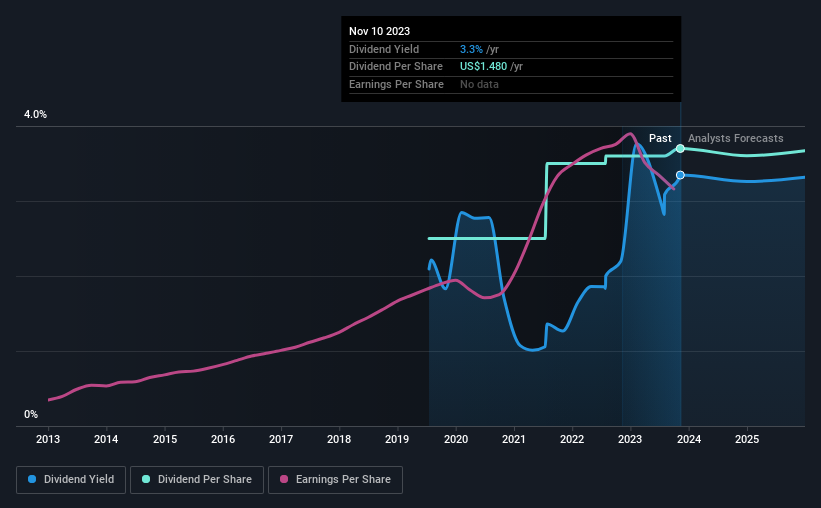Here's What We Like About Western Alliance Bancorporation's (NYSE:WAL) Upcoming Dividend
Readers hoping to buy Western Alliance Bancorporation (NYSE:WAL) for its dividend will need to make their move shortly, as the stock is about to trade ex-dividend. The ex-dividend date occurs one day before the record date which is the day on which shareholders need to be on the company's books in order to receive a dividend. The ex-dividend date is of consequence because whenever a stock is bought or sold, the trade takes at least two business day to settle. This means that investors who purchase Western Alliance Bancorporation's shares on or after the 16th of November will not receive the dividend, which will be paid on the 1st of December.
The company's next dividend payment will be US$0.37 per share. Last year, in total, the company distributed US$1.48 to shareholders. Last year's total dividend payments show that Western Alliance Bancorporation has a trailing yield of 3.3% on the current share price of $44.23. Dividends are a major contributor to investment returns for long term holders, but only if the dividend continues to be paid. So we need to check whether the dividend payments are covered, and if earnings are growing.
See our latest analysis for Western Alliance Bancorporation
Dividends are usually paid out of company profits, so if a company pays out more than it earned then its dividend is usually at greater risk of being cut. Western Alliance Bancorporation is paying out just 18% of its profit after tax, which is comfortably low and leaves plenty of breathing room in the case of adverse events.
Companies that pay out less in dividends than they earn in profits generally have more sustainable dividends. The lower the payout ratio, the more wiggle room the business has before it could be forced to cut the dividend.
Click here to see the company's payout ratio, plus analyst estimates of its future dividends.
Have Earnings And Dividends Been Growing?
Companies with consistently growing earnings per share generally make the best dividend stocks, as they usually find it easier to grow dividends per share. If earnings decline and the company is forced to cut its dividend, investors could watch the value of their investment go up in smoke. That's why it's comforting to see Western Alliance Bancorporation's earnings have been skyrocketing, up 20% per annum for the past five years.
The main way most investors will assess a company's dividend prospects is by checking the historical rate of dividend growth. Western Alliance Bancorporation has delivered 10% dividend growth per year on average over the past four years. It's great to see earnings per share growing rapidly over several years, and dividends per share growing right along with it.
Final Takeaway
Is Western Alliance Bancorporation worth buying for its dividend? Typically, companies that are growing rapidly and paying out a low fraction of earnings are keeping the profits for reinvestment in the business. This strategy can add significant value to shareholders over the long term - as long as it's done without issuing too many new shares. Western Alliance Bancorporation ticks a lot of boxes for us from a dividend perspective, and we think these characteristics should mark the company as deserving of further attention.
So while Western Alliance Bancorporation looks good from a dividend perspective, it's always worthwhile being up to date with the risks involved in this stock. In terms of investment risks, we've identified 1 warning sign with Western Alliance Bancorporation and understanding them should be part of your investment process.
A common investing mistake is buying the first interesting stock you see. Here you can find a full list of high-yield dividend stocks.
Have feedback on this article? Concerned about the content? Get in touch with us directly. Alternatively, email editorial-team (at) simplywallst.com.
This article by Simply Wall St is general in nature. We provide commentary based on historical data and analyst forecasts only using an unbiased methodology and our articles are not intended to be financial advice. It does not constitute a recommendation to buy or sell any stock, and does not take account of your objectives, or your financial situation. We aim to bring you long-term focused analysis driven by fundamental data. Note that our analysis may not factor in the latest price-sensitive company announcements or qualitative material. Simply Wall St has no position in any stocks mentioned.

